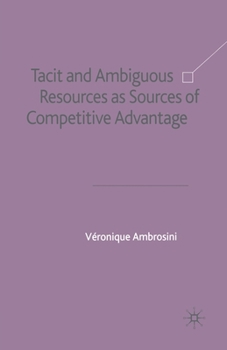Tacit and Ambiguous Resources as Sources of Competitive Advantage
Select Format
Select Condition 
Book Overview
Tacit knowledge has received a good deal of attention in the strategy field and is argued to be a key source of sustainable competitive advantage. Until now the work done has been principally conceptual with little empirical work to support the argument. This book fills the gap in the literature through empirical studies in which causal mapping is used to uncover whether tacit activities and causally ambiguous resources could be perceived to be a...
Format:Paperback
Language:English
ISBN:1349509949
ISBN13:9781349509942
Release Date:January 2003
Publisher:Palgrave MacMillan
Length:193 Pages
Weight:0.59 lbs.
Dimensions:0.5" x 5.5" x 8.5"
Customer Reviews
0 rating





